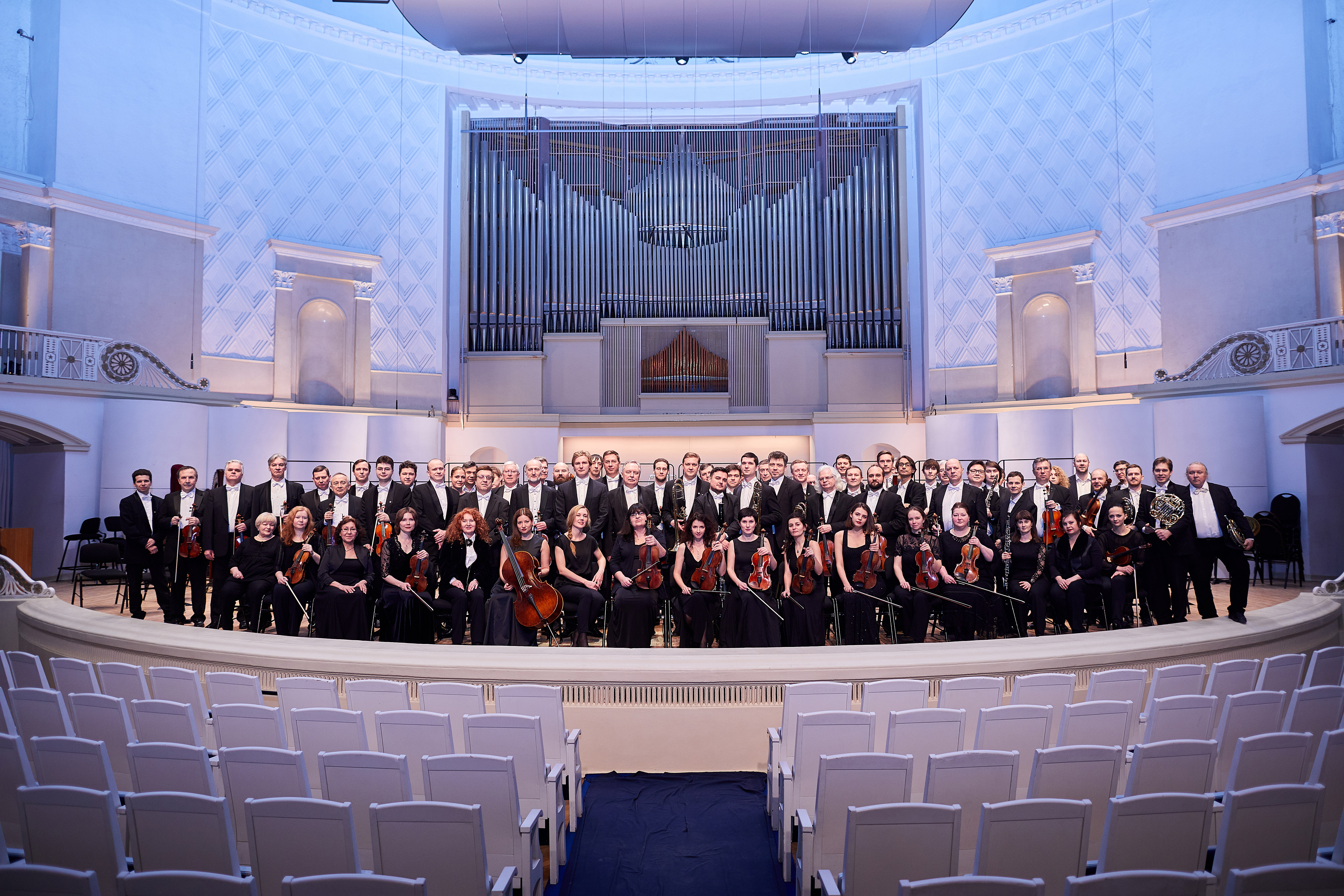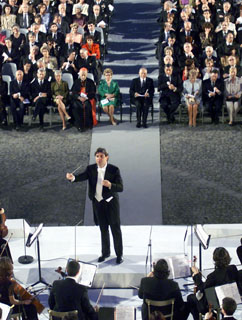|
Kirill Troussov
Kirill Troussov (born ) in Saint Petersburg, is a German violinist and violin teacher based in Munich, Germany. Career Kirill Troussov began playing the violin at the age of four and was taught by Irina Etigon at the Saint Petersburg Conservatory. In 1990 his family moved to Germany where he continued his studies at the Musikhochschule Lübeck and the Hochschule für Musik und Tanz Köln until 2005 with professor Zakhar Bron, whom he also followed for a year at the Reina Sofía School of Music in Madrid. He accomplished his studies by Christoph Poppen at the Hochschule für Musik und Theater München with a Master of Arts (Konzertexamen/Meisterklasse). Among his mentors are Igor Oistrach and Yehudi Menuhin. Life In 1990 he made his debut in Moscow, with the Russian National Orchestra conducted by Arnold Katz. Since then, Kirill Troussov has played with world’s leading orchestras, including the Staatskapelle Berlin, the Leipzig Gewandhaus Orchestra, the Orchestre de Paris, ... [...More Info...] [...Related Items...] OR: [Wikipedia] [Google] [Baidu] |
Saint Petersburg
Saint Petersburg ( rus, links=no, Санкт-Петербург, a=Ru-Sankt Peterburg Leningrad Petrograd Piter.ogg, r=Sankt-Peterburg, p=ˈsankt pʲɪtʲɪrˈburk), formerly known as Petrograd (1914–1924) and later Leningrad (1924–1991), is the second-largest city in Russia. It is situated on the Neva River, at the head of the Gulf of Finland on the Baltic Sea, with a population of roughly 5.4 million residents. Saint Petersburg is the fourth-most populous city in Europe after Istanbul, Moscow and London, the most populous city on the Baltic Sea, and the world's northernmost city of more than 1 million residents. As Russia's Imperial capital, and a historically strategic port, it is governed as a federal city. The city was founded by Tsar Peter the Great on 27 May 1703 on the site of a captured Swedish fortress, and was named after apostle Saint Peter. In Russia, Saint Petersburg is historically and culturally associated with t ... [...More Info...] [...Related Items...] OR: [Wikipedia] [Google] [Baidu] |
Russian National Orchestra
The Russian National Orchestra (russian: Российский национальный оркестр) was founded in Moscow in 1990 by pianist and conductor Mikhail Pletnev. It was the first Russian orchestra to perform at the Apostolic Palace, Vatican and in Israel. History The RNO's first recording (1991) was Tchaikovsky's Symphony No. 6, ''Pathétique,'' released on Virgin Classics. Since then, the orchestra has made over 80 recordings for Deutsche Grammophon, Pentatone, Ondine, Warner Classics and other labels, and with conductors that include RNO Founder and Artistic Director Mikhail Pletnev, Vladimir Jurowski, Paavo Järvi, Kent Nagano, Carlo Ponti, José Serebrier and Vasily Petrenko. Notable releases include the complete Beethoven symphonies and piano concertos on Deutsche Grammophon, Tchaikovsky's six symphonies for Pentatone, and the RNO Shostakovich project, also on Pentatone. The RNO's recording of Prokofiev's ''Peter and the Wolf'' and Beintus's ''Wolf Tracks'', c ... [...More Info...] [...Related Items...] OR: [Wikipedia] [Google] [Baidu] |
Daniele Gatti
Daniele Gatti (born 6 November 1961) is an Italian conductor. He is currently chief conductor of Maggio Musicale Fiorentino, artistic advisor of the Mahler Chamber Orchestra and music director of the Orchestra Mozart. Biography Gatti was born in Milan. He was the music director of the Orchestra Dell'Accademia Nazionale di Santa Cecilia in Rome from 1992 to 1997. In 1997, he became the music director of the Orchestra del Teatro Comunale di Bologna. He has also served as principal guest conductor of the Royal Opera House, Covent Garden. In 2005, alongside Zubin Mehta and Christian Thielemann, Gatti was invited to conduct a concert in commemoration of the fiftieth anniversary of the 1955 reopening and renovation of the Vienna State Opera. His debut at the Bayreuth Festival was in Stefan Herheim's production of ''Parsifal'' in 2008. In 1994, Gatti made his first guest conducting appearance with the Royal Philharmonic Orchestra (RPO). He was immediately offered the position of ... [...More Info...] [...Related Items...] OR: [Wikipedia] [Google] [Baidu] |
Neville Marriner
Sir Neville Marriner, (15 April 1924 – 2 October 2016) was an English violinist and "one of the world's greatest conductors". Gramophone lists Marriner as one of the 50 greatest conductors and another compilation ranks Marriner #14 of the 18 "Greatest and Most Famous Conductors of All Time". He founded the Academy of St Martin in the Fields, and his partnership with them is the most recorded of any orchestra and conductor. Early life Marriner was born in Lincoln, England, the son of Herbert Marriner, a carpenter, and his wife Ethel (née Roberts). He was educated at Lincoln School (then a grammar school), where he played in a jazz band with the composer Steve Race. He initially learned the violin as well as the piano from his father, and later studied the violin with Frederick Mountney. In 1939, he went to the Royal College of Music in London, getting the opportunity to play among the second violins of the London Symphony Orchestra, then conducted by Henry Wood, because ... [...More Info...] [...Related Items...] OR: [Wikipedia] [Google] [Baidu] |
Maggio Musicale Fiorentino
The Maggio Musicale Fiorentino (English: Florence Musical May) is an annual Italian arts festival in Florence, including a notable opera festival, under the auspices of the Opera di Firenze. The festival occurs between late April into June annually, typically with four operas. History In April 1933, on 's idea, Vittorio Gui founded the festival, with the aim of presenting contemporary and forgotten operas in visually dramatic productions. It was the first music festival in Italy and the oldest in Europe after the Salzburg Festival. The first opera presented was Verdi's early ''Nabucco'', his early operas then being rarely staged. The first festival's success, which included two performances of Spontini's ''La Vestale'' with Rosa Ponselle, led to it becoming a biennial event in 1937 with the presentation of nine operas. After 1937, it became an annual festival, except during World War II. Performances took place in the Teatro Comunale and Piccolo Teatro, plus the Teatro della Per ... [...More Info...] [...Related Items...] OR: [Wikipedia] [Google] [Baidu] |
Bamberg Symphony
The Bamberg Symphony (German: Bamberger Symphoniker – Bayerische Staatsphilharmonie) is a German orchestra based in Bamberg. It is one of the most prestigious orchestras in Germany. The orchestra was formed in 1946 mainly from German musicians expelled from Czechoslovakia after WWII, who had previously been members of the German Philharmonic Orchestra of Prague. The orchestra received the title of ''Bayerische Staatsphilharmonie'' (Bavarian State Philharmonic) in 1993. The orchestra commemorated its 60th anniversary on 16 March 2006. Since 1993, the home of the orchestra is the ''Konzert- und Kongresshalle'' (Concert and Congress Hall), which has the nickname ''Sinfonie an der Regnitz'' (Symphony on the Regnitz). Concerts before 1993 were given at the ''Dominikanerbau''. The orchestra receives financial support from the Free State of Bavaria, the city of Bamberg, Oberfranken district and the district of Bamberg. The government of Bavaria retired the orchestra's financial de ... [...More Info...] [...Related Items...] OR: [Wikipedia] [Google] [Baidu] |
Munich Philharmonic
The Munich Philharmonic (german: Münchner Philharmoniker, links=no) is a German symphony orchestra located in the city of Munich. It is one of Munich's four principal orchestras, along with the Bavarian Radio Symphony Orchestra, the Munich Radio Orchestra and the Bavarian State Orchestra. Since 1985, the orchestra has been housed in the Gasteig culture centre. History Foundation The orchestra was founded in Munich in 1893 by Franz Kaim, son of a piano manufacturer, as the Kaim Orchestra. In 1895, it took up residence in the city's ''Tonhalle'' (concert hall). It soon attracted distinguished conductors: Gustav Mahler first directed the group in 1897 and premiered his '' Symphony No. 4'' and '' Symphony No. 8'' with the orchestra, while Bruno Walter directed the orchestra for the posthumous premiere of Mahler's ''Das Lied von der Erde''. Felix Weingartner was music director from 1898 to 1905, and the young Wilhelm Furtwängler made his auspicious conducting debut there in 1906 ... [...More Info...] [...Related Items...] OR: [Wikipedia] [Google] [Baidu] |
Southwest German Radio Symphony Orchestra
The Southwest German Radio Symphony Orchestra (also known in English as the SWR Baden-Baden Freiburg Symphony Orchestra and in German as the Sinfonieorchester des Südwestrundfunks) was a German radio orchestra located in the German cities of Baden-Baden and Freiburg. History The first incarnation of the orchestra occurred in 1946, initially with members of the discontinued spa orchestra of the city as the core of players. The revival of the spa orchestra two years later forced the reorganization of the radio orchestra. Subsequently, Hans Rosbaud was hired as the orchestra's first chief conductor. Rosbaud was already well known as a champion of modern music, and Heinrich Strobel, the music director in charge of the orchestra, shared this sympathy with contemporary music. Thus the orchestra had as its focus performances of modern music. The orchestra was first sponsored by '' Südwestfunk'' (SWF), a public broadcasting corporation headquartered in Baden-Baden. In 1998 SWF merged ... [...More Info...] [...Related Items...] OR: [Wikipedia] [Google] [Baidu] |
Czech Philharmonic
The Česká filharmonie (Czech Philharmonic) is a symphony orchestra based in Prague. The orchestra's principal concert venue is the Rudolfinum. History The name "Czech Philharmonic Orchestra" appeared for the first time in 1894, as the title of the orchestra of the Prague National Theatre. It played its first concert under its current name on January 4, 1896 when Antonín Dvořák conducted his own compositions, but it did not become fully independent from the opera until 1901. The first representative concert took place on October 15, 1901 conducted by Ludvík Čelanský, the first artistic director of the orchestra. In 1908, Gustav Mahler led the orchestra in the world premiere of his Symphony No. 7. The orchestra first became internationally known during the principal conductorship of Václav Talich, who held the post from 1919 to 1931, and again from 1933 to 1941. In 1941, Talich and the orchestra made a controversial journey to Germany, where they performed Bedřich Smet ... [...More Info...] [...Related Items...] OR: [Wikipedia] [Google] [Baidu] |
Academy Of St
An academy (Attic Greek: Ἀκαδήμεια; Koine Greek Ἀκαδημία) is an institution of secondary or tertiary higher learning (and generally also research or honorary membership). The name traces back to Plato's school of philosophy, founded approximately 385 BC at Akademia, a sanctuary of Athena, the goddess of wisdom and skill, north of Athens, Greece. Etymology The word comes from the ''Academy'' in ancient Greece, which derives from the Athenian hero, ''Akademos''. Outside the city walls of Athens, the gymnasium was made famous by Plato as a center of learning. The sacred space, dedicated to the goddess of wisdom, Athena, had formerly been an olive grove, hence the expression "the groves of Academe". In these gardens, the philosopher Plato conversed with followers. Plato developed his sessions into a method of teaching philosophy and in 387 BC, established what is known today as the Old Academy. By extension, ''academia'' has come to mean the accumulation, dev ... [...More Info...] [...Related Items...] OR: [Wikipedia] [Google] [Baidu] |
Orchestre National De France
The Orchestre national de France (ONF; literal translation, ''National Orchestra of France'') is a French symphony orchestra based in Paris, founded in 1934. Placed under the administration of the French national radio (named Radio France since 1975), the ONF performs mainly in the Théâtre des Champs-Élysées from where all its concerts are broadcast. Some concerts are also held in the ''Salle Olivier Messiaen'' in the Maison de Radio France (formerly known as Maison de la Radio). History The orchestra has had several names over its history: * 1934–1945: ''Orchestre national'' (National Orchestra) * 1945–1949: ''Orchestre national de la Radiodiffusion française'' (French Radio National Orchestra) * 1949–1964: ''Orchestre national de la Radio-télévision française'' or ''Orchestre national de la RTF'' (French Radio and Television National Orchestra) * 1964–1974: ''Orchestre national de l'Office de radiodiffusion-télévision française'' or ''Orchestre national ... [...More Info...] [...Related Items...] OR: [Wikipedia] [Google] [Baidu] |





